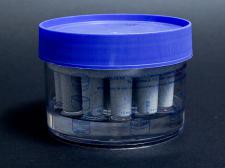Surprising Surge of Egg Freezing During the Pandemic Raises Ethical Questions
By Danielle Pacia and Jacob Howard,
Bioethics Forum
| 01. 21. 2021
In the midst of the pandemic, life has been put on hold in a multitude of ways. Many women are taking a literal approach and electing to freeze their eggs with a process known as oocyte cryopreservation (OCP). Contrary to the expectations of many fertility clinics, OCP has increased sharply in 2020, reports Time. What was supposed to be a bust for the fertility industry has become a boom. As clinics grapple with this unexpected surge, pre-pandemic concerns about a lack of information on risks, benefits, and harms of OCP have persisted and are likely being exacerbated amidst the Covid-19 pandemic.
Prior to 2020, interest in egg freezing had already been increasing at a rapid rate. According to a study published in 2017 by the Society for Assisted Reproductive Technology, banking and freezing of eggs increased by 24% between 2016 and 2017. Each year, more women participate in the expensive process of OCP, with costs ranging from $6,000 to $20,000 per cycle, and additional yearly storage fees of $500 to $600. As popularity has risen, ethicists have voiced...
Related Articles
By Diaa Hadid and Shweta Desai, NPR | 01.29.2026
MUMBRA, India — The afternoon sun shines on the woman in a commuter-town café, highlighting her almond-shaped eyes and pale skin, a look often sought after by couples who need an egg to have a baby.
"I have good eggs,"...
By George Janes, BioNews | 01.12.2026
A heart attack patient has become the first person to be treated in a clinical trial of an experimental gene therapy, which aims to strengthen blood vessels after coronary bypass surgery.
Coronary artery bypass surgery is performed to treat...
By Staff, ScienceDaily | 01.05.2026
Scientists at UNSW Sydney have developed a new form of CRISPR technology that could make gene therapy safer while also resolving a decades-long debate about how genes are switched off. The research shows that small chemical markers attached to DNA
...
Following a long-standing CGS tradition, we present a selection of our favorite Biopolitical Times posts of the past year.
In 2025, we published up to four posts every month, written by 12 authors (staff, consultants and allies), some in collaboration and one simply credited to CGS.
These titles are presented in chronological order, except for three In Memoriam notices, which follow. Many more posts that are worth your time can be found in the archive. Scroll down and “VIEW...




